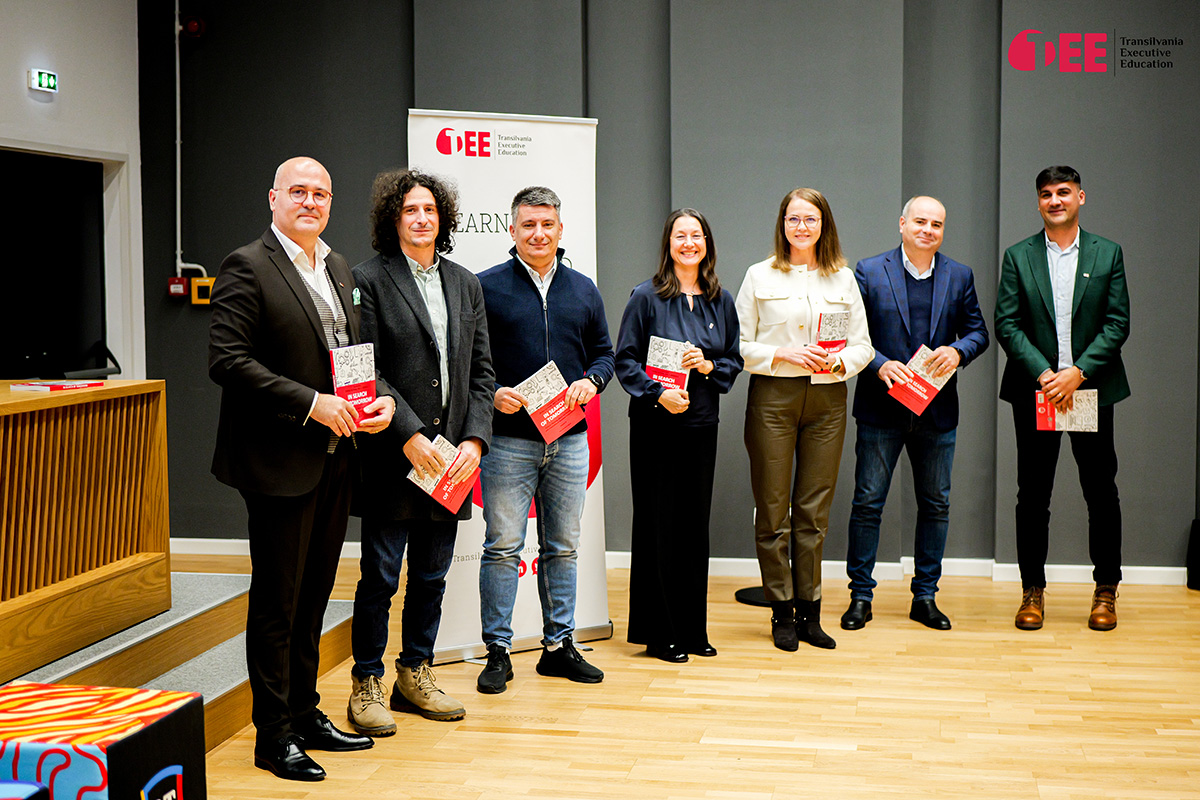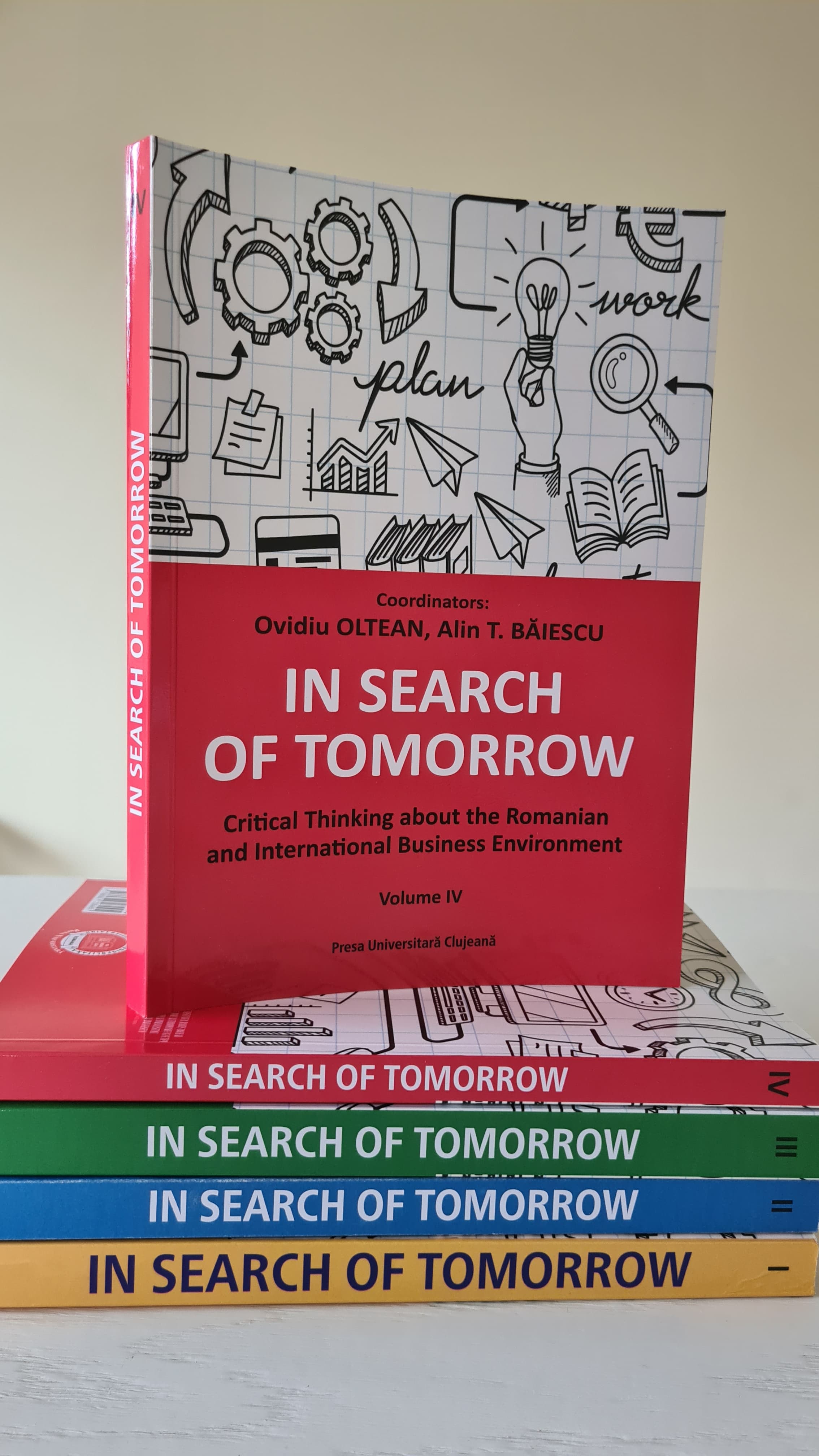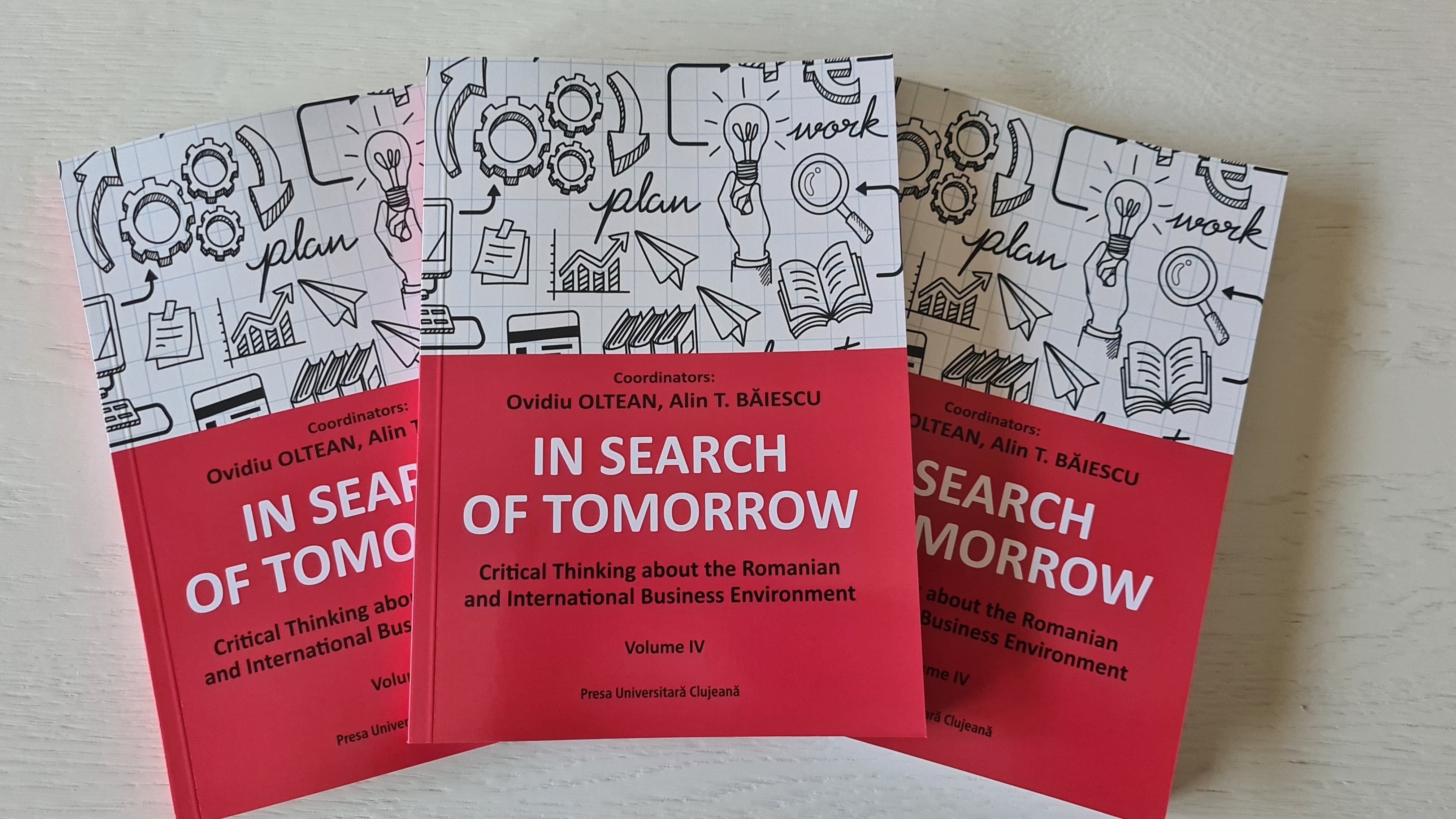The Rethinking Globalisation: The Cluj Way conference provided an ideal platform to launch the fourth volume of In Search of Tomorrow: Critical Thinking about the Romanian and International Business Environment. This volume showcases the best research work produced by EMBA students from Buckingham University’s Executive MBA Class of 2022-2024, delivered in Cluj-Napoca.
This book is a testament to the diverse expertise and experiences of the graduates who have played important roles in shaping the trajectory of Romania’s business sectors. The authors are: Leonard Abu-Saa, Adriana Calbaza, Andrei Chifor, Marian-Silviu Ciupeiu, Alina Dulama, Adina-Sorina Hopîrtean, Sonia-Rodica Ilea, Raluca-Cristina Mureșanu, Ioan-Florian Szilagyi, Dan Șteț, Daniela Șuhanea and Flaviu-Ciprian Zapca. The book project was coordinated by Dr. Ovidiu Oltean and Dr. Alin Baiescu – lecturers for the TEE EMBA programme, and published by Cluj University Press.
Most of the essays written by the EMBA students were not created merely to fulfill an academic requirement. These students aimed to deepen their understanding of their own managerial and entrepreneurial experiences through various economic and business theories. As a result, they produced essays that are not only assignments, but valuable resources they can bring back to their companies.

Why to read this book?
These essays collectively provide a thorough and nuanced perspective on Romania's business landscape, highlighting advancements in managerial sophistication, strategic foresight, and organizational innovation. The research showcases the increasing maturity of Romania’s business leaders, who are now well-prepared to guide their companies toward sustained growth and competitiveness on a global scale. Each essay reflects the progressive thinking fostered within Romania’s Executive MBA programmes, providing valuable insights for business leaders, scholars, and policymakers alike. By addressing both theoretical and practical aspects of business management, this collection underscores the growth of Romania’s business community as it emerges as a significant force in the global economy.
This book could become a useful guide for other EMBA students, in their attempt to write good papers, appreciated by their professors for the theoretical aspects, layout and critical thinking, but also useful for the ideas that could be effectively applied in their daily activities. Nevertheless, another group that we address in this book is made of the masteral and doctoral students in economics and business schools, interested in being up-to-date not only with the theoretical concepts, but also with the real-life insights, provided by managers and entrepreneurs from the local and international business environment. And most importantly, to any leaders involved in the Romanian business environment who is interested in exploring some potential solutions for their own business.

Topics addressed in the book
Leonard Abu-Saa’s essay on applying the VSM framework to a software product organization explores the application of systems thinking to improve organizational performance. Abu-Saa’s analysis reveals how the VSM framework can be used to identify inefficiencies and develop strategies for long-term viability in the software industry. His work emphasizes the importance of aligning internal processes with broader corporate goals, offering a roadmap for software firms seeking to navigate the complexities of a rapidly evolving industry.
In the realm of financial analysis, Adriana Calbaza offers a comprehensive study on the financial performance of Shell plc, an engineering company, from 2017 to 2021. Calbaza’s detailed analysis of key financial indicators, such as revenue, profitability, and return on assets, provides valuable insights into how Shell plc navigated industry volatility and global market disruptions. Her work highlights the importance of agility and strategic financial management in ensuring long-term business viability, particularly in industries subject to rapid fluctuations in demand and pricing.
Andrei Chifor presents a compelling case study on improving manufacturing processes with Computer-Aided Nesting (CAN) software. His research demonstrates how advanced software solutions can optimize material usage, reduce waste, and improve production efficiency in a Romanian manufacturing facility. Chifor’s work is a valuable contribution to the field of manufacturing innovation, showing how Romanian companies can leverage technology to enhance their competitiveness in both local and international markets.
Marian Ciupeiu’s essay, The Overwhelming Transformation of Company A, provides a critical analysis of a Romanian IT outsourcing firm undergoing significant strategic and organizational changes. Ciupeiu explores the challenges faced by Company A as it transitions from a traditional software development model to a more specialized offering. His research delves into issues such as innovation, company culture, and post-communist mental models that still influence Romanian businesses. Ciupeiu offers practical recommendations for navigating these complex transformations, emphasizing the importance of strategic foresight, domain expertise, and adaptive organizational structures.
Alina Dulama contributes with her essay by applying the Viable System Model (VSM) to a multinational corporation, examining how this framework can help businesses adapt their software systems to meet evolving market needs. By focusing on systemic thinking and organizational agility, Dulama demonstrates how Romanian companies can enhance their operational efficiency and resilience in a rapidly changing technological landscape.
Adina Hopîrtean’s research into employee engagement during M&A transitions provides a critical complement to Szilagyi’s strategic focus. Hopîrtean explores the human side of mergers, examining how employees perceive organizational change and how their engagement levels can impact the success of a merger. Her research underscores the importance of clear communication, leadership support, and cultural alignment in maintaining morale and productivity during periods of significant transition. Hopîrtean’s insights are particularly relevant as Romania continues to see an influx of foreign investment, which often brings with it the challenge of integrating diverse corporate cultures and workforces.
The theme of process optimisation continues with Sonia Ilea’s detailed case study on improving spare part kit production. Ilea’s research focuses on the application of Kaizen and Kanban methodologies to reduce lead times, improve service levels, and eliminate waste in a multinational manufacturing facility. Her analysis offers practical insights into how continuous improvement strategies can lead to significant operational enhancements. By focusing on supply chain and production efficiencies, Ilea’s work highlights how Romanian firms are adopting advanced process management techniques to stay competitive in global markets.
Raluca Mureșanu’s contribution to this volume includes one essays focused on human capital management. Mureșanu examines the job design of credit risk analysts in a Romanian bank, using the Job Characteristics Model (JCM) to assess the potential for intrinsic motivation and job satisfaction. Her findings emphasize the need for aligning job roles with employee strengths and growth needs, offering practical steps for improving job design to enhance motivation and performance. Her work underscores the growing importance of talent management in Romania’s banking sector, where human capital is increasingly seen as a critical driver of business success.
Leadership transformation is another critical theme of this volume. Dan Șteț’s essay explores the contrasts between traditional and contemporary leadership styles during the acquisition of a Romanian family business by a multinational corporation. Steț analyzes how different leadership approaches impact the success of organizational change, with a focus on transactional versus transformational leadership. His insights provide valuable lessons for Romanian managers navigating the challenges of leadership transitions in an increasingly globalized business environment.
Ethics and sustainability also feature prominently in this collection. Daniela Șuhanea’s research into ethical issues in the advertising sector amid the climate crisis highlights the industry's role in shaping consumer behavior and its responsibility in mitigating environmental harm. Șuhanea critiques the practice of greenwashing and examines how advertising agencies can contribute to sustainable business practices by adopting transparent and responsible communication strategies. Her work offers a timely reflection on how Romanian businesses can balance profitability with environmental and ethical considerations in a world increasingly focused on sustainability.
Florin Szilagyi’s essay on strategic decision-making and implementation post-M&A sets the tone for the volume. His work focuses on the complexities of managing mergers and acquisitions, particularly the post-merger integration process. Szilagyi highlights the importance of aligning corporate strategies and harmonizing operational processes to ensure long-term success. His study illustrates how Romanian businesses, once characterized by ad-hoc responses to mergers, have developed a deep understanding of how to not only survive but thrive through these complex transitions. By emphasizing leadership, cultural integration, and employee engagement, Szilagyi presents a roadmap for companies navigating the often-turbulent waters of post-merger integration.
Flaviu Zapca contributes one important essay to this volume focused on organizational structure in IT outsourcing, where he applies systemic management methodologies to improve organizational efficiency and address challenges arising from the integration of an acquired company. Zapca’s essay provides an in-depth look at how businesses can develop and execute successful marketing strategies, from market analysis to product positioning and promotional tactics. His research is particularly relevant for companies in competitive industries, offering practical guidance on how to gain market share and build brand loyalty in a crowded marketplace. His work emphasizes the importance of adopting flexible, non-hierarchical structures that can adapt to the unique demands of the IT outsourcing industry.
How to order the book
The book can be ordered by writing an email to
Special thank you to Nancy Rise for helping us in editing the volume. We appreciate her input and work.
Read here about the other volumes published by TEE team:




